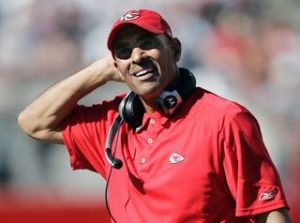“When you walk in the huddle, we’re all a big team.”
by Darnell Mayberry
http://newsok.com/the-collected-wisdom-of-herm-edwards/article/5467907

Kansas City Chiefs head coach Herm Edwards walks on the sideline in the fourth quarter of an NFL football game against the New England Patriots, Sunday, Sept. 7, 2008, in Foxborough, Mass. The Patriots won 17-10. (AP Photo/Michael Dwyer)
Herman Edwards is a former NFL defensive back and head coach of the New York Jets and Kansas City Chiefs. Since 2009 he’s been a NFL analyst for ESPN. On a recent trip to Oklahoma City in support of Fields and Futures, a grassroots organization to serve local public schools by building athletic fields to benefit kids and strengthen neighborhoods, Edwards sat down with The Oklahoman to share his collected wisdom.
Life is not a dress rehearsal. You only get one life. And what you do in that life is up to you. You get to choose your own direction.
If you’re going to be successful in anything, you’ve got to enjoy what you’re doing. There are going to be some good days and bad days. But in the end, it’s a matter of your work ethic and how you view things. And I’ve always taken it to the extreme.
It’s too hard to be negative. It takes too much energy to be negative, and you get nothing out of it. I’d rather be positive. The glass is always full for me.
I tell young people this all the time, do you want to be a follower or do you want to be a leader? Because the one thing I know when you’re a leader, you turn your back to the crowd. You might not be liked by a lot of people. But they’ll respect you.
I wanted to always be a leader. I didn’t want to be a follower. I knew that if I followed I wasn’t making my own decision. I wanted to make my own decisions because I could live with the consequences of that.
At a young age, I was one of those guys that when it came to competing I loved competition. But I learned at a very young age that sports are not about the opponent. The opponent is me. You compete against you. Life’s about competing. Every day you get up and compete. But the key is you compete against yourself. How do you better yourself every day?
I never let anyone put me in a box. I never let anyone limit my expectations. We do that at times. I set my own standards, my own expectations.
People tell you what to do and how to do it. I wanted to know why. I was in search of knowledge. I wanted to know why. Because until you understand why you have no knowledge. In athletics there was always conflict for me because I was always questioning coaches. It wasn’t so much I was questioning his authority. It was I wanted his knowledge.
When I grew up, I watched Burt Lancaster play Jim Thorpe, the greatest athlete to ever walk the face of the earth. Growing up, I said ‘I want to be like that guy.’ I want to be Jim Thorpe. What that man accomplished, that was my hero. I told everybody in my neighborhood I’m going to be Jim Thorpe. Nobody believed me. I was 8 years old. They thought I was crazy.
My dad told me something when I was very young. He said, ‘Son, let me tell you what I’m going to give you. It’s something that you can’t buy. You’ll never be able to buy it. I’m going to give you a good last name.’ And as he’s walking away, he turned around and looked at me and said ‘Don’t you screw it up.’
Be a man of integrity. That’s the best advice my dad gave me. Your words and your life have got to match up. And I’ve tried to live my life that way.
You realize as you get older the only thing you really have that you give to your children is your last name. That becomes your legacy. You don’t have to be an athlete to have a legacy.
The thing I learned from my dad was discipline and toughness. Here was a guy who didn’t have a high school education. He joined the army when he was 16, 17 years old. He lived in the south and had to get out of the south. He had a bunch of brothers and sisters, and his mom and dad passed away when he was very young. And he joined the service.
His whole mindset was he wanted to make it better for his children. He told me after he retired, ‘I was willing to give my life up for a country that I love but also for you to have a better opportunity than I did growing up.’ That was his message. And I understood it. It was always about the betterment of the next generation. You need to make it better for the people that follow you.
Life is real simple. We work to make a living. But what we give is to make a life.
My high school football coach, Dan Albert, really molded me early. He was always about the team. And he taught me that the team is bigger than any player. And he was right. It is.
Life’s about huddles. And when you think about a huddle in sports, it has one vision: to have success. There’s a lot of moving parts in the huddle. Different religions. Different neighborhoods. Different affiliations. Different colors. It doesn’t matter. When you walk in the huddle, we’re all a big team.
I had some good college coaches, but not as much as Dick Vermeil. He was a big influence.
My other big influence was Tony Dungy. We came into the NFL about the same time. I had an understanding, but maybe not as deep as Tony, of faith and how you want to live your life as a coach. He was really a big influence on me. I grew under him. He really taught me how to be a coach. But more than that how to be a better man.
A tough moment for me was when 9/11 hit. I was the head coach of the Jets. You sit there knowing that the next week they were going to play a game. And I went, ‘We can’t play a game. Are you kidding me?’ Everything my father taught me about service and about people’s lives that he fought for so that we could have our freedoms, when I saw those buildings go down I said ‘Our freedoms have been attacked.’
I had a meeting with my football team. I said ‘We don’t have to get on the plane and go play the Oakland Raiders. If you guys decide you don’t want to play, we won’t play.’ And I said ‘I’m going to leave, and you guys vote on what you want to do.’ I came back 20 minutes later and they said ‘Coach, we don’t want to get on the plane.’ I called the owner and told him and said ‘You better call the commissioner. We’re not getting on the plane.’ He said, what if they don’t cancel the games. I said, ‘Well, we’re going to forfeit.’ That was my first year as a head coach. I was 0-1 already. I was about to be 0-2 but didn’t care. It had nothing to do with the game. What had happened to this country was bigger than that football game. And for me to be a head coach, I had to take a stand and say, ‘No. We’re not doing this.’ Eventually, the league, by Thursday, said they were cancelling all the games.
It was unbelievable. You’re affected as an American. The coaching hat was off. What we did was got busses for our players and went down to the site. And we loaded up trucks with supplies for all the first responders and met some of the guys and thanked them. That was important for the healing process. As an American at that point in time you wanted to do something. It’s kind of ironic because when that thing hit our country became closer. They just attacked America. All of a sudden everybody got in the huddle.
I knew I wanted to be a coach when I was a player. I felt like what football had done for me, I wanted to have the ability to give something back to the game. We are all keepers of this great game, and how we coach it is important.
Nobody’s ego should come in the way of the team. When it comes to playing the game of football, your personal agenda shouldn’t come in front of that. It can’t. It’s about the integrity of the game. You don’t use your personal platform during the course of a season to promote yourself or your issues you may have with somebody else.
You want egos. You want personalities. But when they bring them to the table, there’s a common cause, it’s win. How do we create an atmosphere where those personalities can come about and those personalities can respect each other, but when they walk in the huddle it’s one focus?
I’ve been asked to go back into coaching on numerous occasions. I’m done. I’ve got a bigger platform now than I would coaching. And I can spend more time with my daughters. I don’t want to move anymore. But I actually have a bigger platform. Because I can say things that coaches can’t say.
When I was a coach, I never worried about Xs and Os. If I can make them better men, they’d be good football players.
I don’t think you force kids into anything. I think kids should play all sports to figure out if they like any of them. But also for the camaraderie you gain and the life skills you gain from sports. You find out a lot about yourself.
I laugh when I see the victory formation. I always tell people I was in the right place at the right time (on the Miracle at the Meadowlands). It was a unique situation. When something like that happens and you’re involved in a play like that, you never think when the play is over that it would affect football the way it affected it as far as the victory formation.
Lawrence Taylor. Best athlete I ever saw. I watched him destroy teams. He was a dominant player. That guy could wreck the game.
I had a lot of good teammates. The best was probably Ron Jaworski. The way we competed against each other in practice every day, we went at it every day. He forced me to get better. I forced him to get better.
It’s real simple. I want to be remembered as a man of integrity. And it was always about the game. And the people that I coached and played with, I was accountable to them. That’s it.
I’m just an ambassador for the game, and I’ve been blessed. I tell people all the time, from high school until right now I’ve never had a job.
